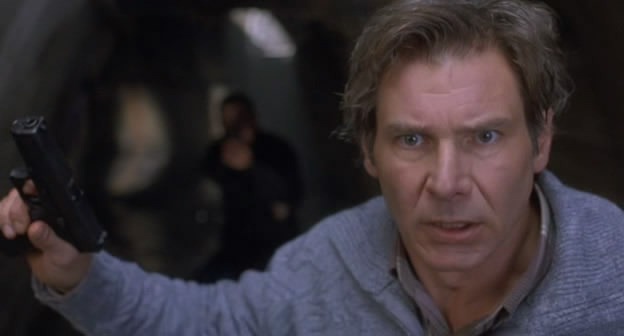The
1993 Andrew Davis film The Fugitive
is a chase thriller that stars Harrison Ford. Ford plays Richard Kimble, a
surgeon framed for the murder of his wife by a friend with the agenda of
peddling a new prescription drug. The interesting part about this film is that
the audience is not informed of Richard Kimble’s innocence until later in the
film. Until it is explicitly revealed through a flashback that he is innocent
and that a one-armed man really did in fact murder his wife, it is left up to
the audience to decide whether or not they think he is innocent. Until the
point where the audience is given this piece of information, there are little
hints left by the filmmaker suggesting that Kimble is an innocent man. The
first of these major hints occurs when he escapes form the bus transporting him
to prison. Kimble is given the opportunity to either do what Is ‘right’ and
save the life of the corrections officer who was stabbed by another inmate or
go for the more selfish opportunity of escaping. He of course goes to save the life
of the officer and drags him out of the wreckage, something the other officer
would not even do. This demonstrates that Kimble has an even sounder moral
compass than an officer of the law.

Kimble
is confronted with another moral dilemma when he sneaks into his former work
place, a hospital. As he is about to exit the hospital, he sees that his one exit
point is blocked by a horde of cops. He then holds off on his departure and
hangs back. He then observes a swamped hospital staff that was not properly attending
to a young boy. A doctor then requests him to send this boy to another
department in the hospital. His inclinations as a doctor then kick in and he
looks at the boys charts and realizes that he needed surgery. It is a
convincing portrayal of a doctor as “Harrison Ford indulged in intensive
research for his role as a physician. He accompanied actual doctors on their
rounds, socialized with them, and watched them prepare for surgery” (Pfeiffer
208). He then made the proper adjustments to the boy’s charts and sent him into
surgery. His actions actually ended up saving the boy’s life. Kimble was
presented with another moral dilemma and ended up again making the non-selfish decision
to help another person despite the risks. The easier route for Kimble would
have been to simply send the boy where the doctor requested him to and gotten
the hell out of there. Instead he chose to help the boy. This benevolent decision
hints at his innocence. A man who murdered his wife would have no problem with sending
the boy into the wrong wing for the sake of his escape. Kimble’s innocence is suggested
through this scene.

I agree that the movie director does leave various hints of Kimble's innocence the train wreck being the first one in which Kimble sticks with his origins and does do the right thing. The scene in the hospital shows the directors aim even more clearly seeing as there was no way Kimble should of been able to escape the hospital which was surrounded by police officers. Not only does he escape but saves a young mans life in the process. The good deeds of Kimble throughout the movie show he is genuinely a good man and couldn't be capable of killing his on wife.
ReplyDeleteZoe Hall
ReplyDeleteI really liked your comment, "this demonstrates that Kimble has an even sounder moral compass than an officer of the law." This elevated moral code is a common theme throughout "The Fugitive." Kimble frequently demonstrates a selfless concern for others that sets him apart from the other characters in the movie. Something that this made me think about was the parallel between Kimble and the other inmate who escaped the bus/train scene. The other escapee, the audience assumes is guilty. From the first impression of him frantically trying to escape, and then Kimble's request for the inmate not to get in any trouble. Whereas Kimble frequently demonstrates concern for others, the inmate shows the opposite emotion and actions when he uses the young U.S. marshal as a shield against the other marshals. Even Deputy Gerard shows a lack of concern for human life when he risks the life of the young U.S. marshal when shooting down the inmate. These parallel characters serve to promote Kimble's innocence